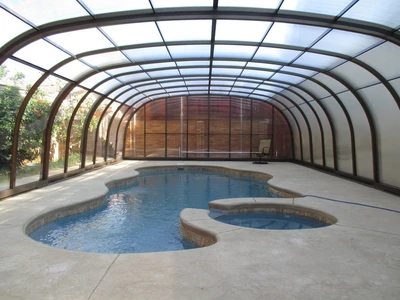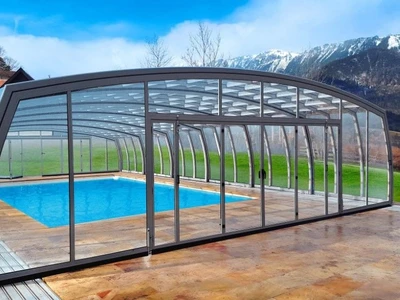Check out some of the benefits that an enclosure adds to your pool during the winter!
Blog

Important criteria for choosing a pool enclosure
Are you thinking about getting a pool enclosure but don’t know where to start? Don’t worry – we’re here to help! With over 25 years of experience and a broad portfolio of enclosure models, we are prepared to handle a wide range of situations and requirements that might arise when choosing a pool enclosure.

Benefits of Pool Enclosures and Patio Enclosures in the Winter
Swimming season is always considered as the summer. But what if we told you, it didn’t have to be limited like that? With our pool enclosures, you can transform your pool into a 365-day per year paradice.

The Good, Bad, and Ugly of a Pool Cover instead of an Enclosure
Your pool is an investment, one that can and should be protected. It’s important to choose the right kind of cover to suit your needs. There are many types of different pool protectants to choose from. The two primary types are covers and enclosures.

ACCORDION DOOR - New Product
Introducing the Accordion Door: A Revolutionary Pool Enclosure Innovation

Enclosure Pallet Unload Steps
Step by step directions for how pool enclosure pallet is to be unloaded from delivery truck.

What are the benefits of enclosures in spring?
During the spring season, the weather is unstable. Sometimes it is cold, sometimes it rains and sometimes the sun shines.

Take a look at the amazing pool enclosure projects we installed across the USA in 2024
Our latest enclosures offer unmatched quality combined with exceptional design, ensuring long-term customer satisfaction.

Top tips for furnishing your covered terrace
Your covered terrace is the ideal place to combine outdoor leisure with the comfort of your living room. At least it can be – if you choose a multifunctional bioclimatic Pergola Venti or another type of patio cover from the CORSO range.

Why get a pool or patio enclosure?
You’ve bought a beautiful and spacious pool, but you’re disappointed that you can only swim and enjoy it for a few months each year?

How to maintain your enclosure all year round?
Regular maintenance of the enclosure is essential for its long service life and reliable functionality. In this article, Alukov experts will advise you on how to take care of your enclosure throughout the year.

Benefits of patio and pool enclosures in autumn
Summer is ending and autumn is here. Cooler and rainy weather is coming, the leaves are falling off the trees and bushes.
